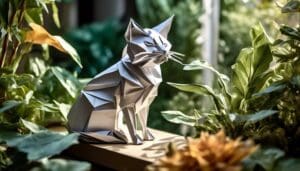As your cat gracefully ages, you may notice subtle changes in their behavior and physical health. It’s a natural part of the journey, but it also means it’s time to pay closer attention to their nutritional needs.
Seven essential nutrients play a crucial role in supporting the health and vitality of aging cats. Understanding these nutrients and how they contribute to your cat’s well-being is essential for providing the best care in their golden years.
Key Takeaways
- Senior cats require a higher protein diet and regular assessment of nutrient intake for optimal nutrition.
- Adequate hydration is crucial for aging cats’ health, and placing water bowls in multiple areas of the home can encourage drinking.
- Including sources of essential fatty acids, such as fish oil or flaxseed, in the diet supports skin, coat, cognitive function, and overall well-being.
- Digestible carbohydrates, minerals, and vitamins, including vitamin E, are important for maintaining bone health, immune system function, and cognitive health in aging cats.
Protein Requirements
Assessing the protein requirements of your aging cat is crucial for maintaining their health and vitality in their senior years. As your beloved cat matures, their nutritional needs change, and protein becomes even more essential.
Senior cats require a diet higher in protein than regular adult cat food. The ongoing debate about specific protein requirements for senior cats highlights the complexity of this issue. However, what’s clear is the importance of protein quality and digestibility for senior cat nutrition.
Ensuring a balanced and complete diet specifically formulated for senior cats is vital. Regular assessment of nutrient intake and potential supplementation is important for meeting senior cats’ protein needs. This becomes crucial if your senior cat is dealing with chronic kidney disease, as protein requirements may need to be adjusted.
Providing access to fresh water is equally important to support their overall health and digestion. By prioritizing your aging cat’s protein intake, you’re actively contributing to their well-being and longevity.
Essential Fatty Acids
It’s very important to include Essential Fatty Acids in the diet of your aging cat to help maintain their health. As cats get older, their dietary needs change, making Essential Fatty Acids more important.
Omega-3 and Omega-6 fatty acids, nutrients found in higher protein and fat content, are vital for supporting your mature adult or older cat’s skin, coat, and cognitive function. These essential nutrients not only contribute to healthy skin and coat but also play a role in reducing inflammation and supporting cardiovascular health. They support cognitive function, contributing to mental acuity and alertness in aging cats.
Including sources of Essential Fatty Acids, such as fish oil or flaxseed, in your cat’s diet can also aid in maintaining joint health and mobility. These fatty acids are crucial for bolstering your cat’s immune system, assisting in their ability to combat age-related illnesses and infections.
Prioritizing Essential Fatty Acids in your aging cat’s diet is a compassionate way to support their overall well-being and help them thrive in their later years.
Digestible Carbohydrates
Integrating digestible carbohydrates into your aging cat’s diet can help provide the essential energy they need to maintain overall health and well-being. As your cat ages, their dietary needs change, and including the right balance of nutrients becomes crucial. When considering your mature cat’s diet, it’s important to understand the role of digestible carbohydrates in supporting their health.
Here’s what you need to know:
- Energy Balance: Digestible carbohydrates play a vital role in providing essential energy for aging cats. As cats age, their metabolism may change, and having the right balance of energy-providing nutrients becomes increasingly important.
- Nutritional Support: Including digestible carbohydrates in their diet can help maintain overall health in older cats. It’s essential to ensure that their food provides the necessary nutrients to support their age-related changes and to keep them active and vibrant.
- Therapeutic Diets: Senior cat food formulas may include balanced levels of carbohydrates to meet the unique nutritional needs of aging cats. These diets can be particularly beneficial for addressing specific health concerns such as renal health or weight loss in mature cats.
Understanding the role of digestible carbohydrates in your aging cat’s diet is a compassionate way to support their well-being as they enter their senior years.
Vitamins for Senior Cats
As your senior cat’s dietary needs evolve, incorporating vital vitamins becomes increasingly crucial to support their changing health requirements.
Older cats require higher levels of certain vitamins, such as vitamin E, to help maintain their immune system and overall well-being.
When feeding a diet specifically formulated for the senior life stage, it’s important to ensure that it contains adequate levels of fat-soluble vitamins, including vitamin E, to support your cat’s health.
Monitoring phosphorus levels is essential as older cats are more susceptible to kidney issues.
Providing senior cat food that’s tailored to their nutritional needs, including the right balance of vitamins, can help maintain their health and vitality.
Consulting with a veterinarian to determine the appropriate vitamin and nutrient levels for your senior cat is crucial, as over-supplementing can have adverse effects.
Minerals for Aging Felines
Ensuring that your senior cat’s diet includes essential minerals is crucial for their health as they age. Calcium, phosphorus, and magnesium are important for maintaining bone health and strength, particularly in senior and geriatric cats.
Zinc, copper, and selenium also play a significant role in supporting the immune system and overall health of aging felines. These minerals are essential for maintaining your cat’s health and body condition as they transition into their mature and geriatric years.
Sodium and potassium are important for muscle function, nerve transmission, and maintaining hydration in aging felines. These minerals are crucial for supporting the overall well-being of your adult cat and ensuring they can continue to lead a healthy and active life.
Understanding the significance of these minerals is essential for preventing health issues such as renal disease in senior cats. They are fundamental nutrients for cats as they age. The American Association of feline Practitioners emphasizes the importance of these minerals in senior cat care and their role in maintaining your cat’s overall health and well-being.
Hydration Needs
Encouraging regular water intake in aging felines is crucial for maintaining their health and well-being as their sensitivity to thirst decreases with age. Mature and senior cats often have lower activity levels and energy requirements, which can lead to reduced water intake.
To ensure they stay adequately hydrated, it’s essential to monitor their water intake levels closely. Placing water bowls in multiple areas of the home can encourage drinking, as some senior cats may have difficulty moving long distances to find water. Incorporating wet or canned food into their diet can increase their overall water intake.
Adequate hydration is vital for preventing urinary tract diseases and supporting organ function in aging felines. As a caregiver for adult and senior cats, it’s important to be mindful of their caloric intake and hydration needs. By providing easy access to water and being attentive to their water intake, you can significantly contribute to the health and well-being of your aging cats.
Nutrients for Cognitive Health
Supporting your aging cat’s cognitive health requires providing essential nutrients such as omega-3 fatty acids and antioxidants. These nutrients play a crucial role in maintaining cognitive function and reducing the risk of cognitive decline in senior cats.
Here are three essential nutrients for cognitive health in aging felines:
- Omega-3 Fatty Acids: Incorporating omega-3 fatty acids into your cat’s diet can support brain health and cognitive function. These fatty acids have been linked to improved cognitive function and may help reduce the risk of cognitive dysfunction in older cats.
- Antioxidants: Antioxidants such as vitamin E and beta carotene can aid in protecting the brain from oxidative damage, which is beneficial for maintaining cognitive health in aging felines.
- Balanced and Complete Diet: Ensuring your aging cat’s diet is formulated to provide essential nutrients for cognitive support is crucial. A diet rich in high-quality protein, along with the inclusion of these vital nutrients, can contribute to maintaining cognitive function as your cat ages.
As your cat ages, it’s essential to consider dietary changes that can positively impact their cognitive health. Consulting with a veterinary nutritionist or the American Association of feline Practitioners can provide valuable guidance in ensuring your senior cat’s cognitive health is well-supported.
Pay close attention to signs of cognitive decline in your older cat, especially if they already have health issues like heart disease or muscle problems. Ensuring your cat eats a healthy diet is a key way to improve their cognitive health and overall wellness.
Frequently Asked Questions
What Nutrition Do Senior Cats Need?
As senior cats age, their dietary needs evolve, necessitating tailored nutrients, more hydration, and calorie management to maintain their health and vitality.
What Is the Best Food for Aging Cat?
For your aging cat, consider senior cat food with adjusted nutrients and calorie control to manage weight. Consult a vet for personalized recommendations. Ensure regular water access and consider canned food for hydration.
What Supplements Are Good for Older Cats?
You should consider giving your older cat fish oil for its anti-inflammatory benefits, probiotics for digestive health, and glucosamine for joint support. These supplements can help your aging cat stay healthy and comfortable.
How Do You Enrich a Senior Cat’s Life?
To enrich a senior cat’s life, engage in interactive play, provide cozy spots for napping, and offer mental stimulation with puzzle toys. Regular grooming, gentle exercise, and loving attention can also promote a sense of well-being.




